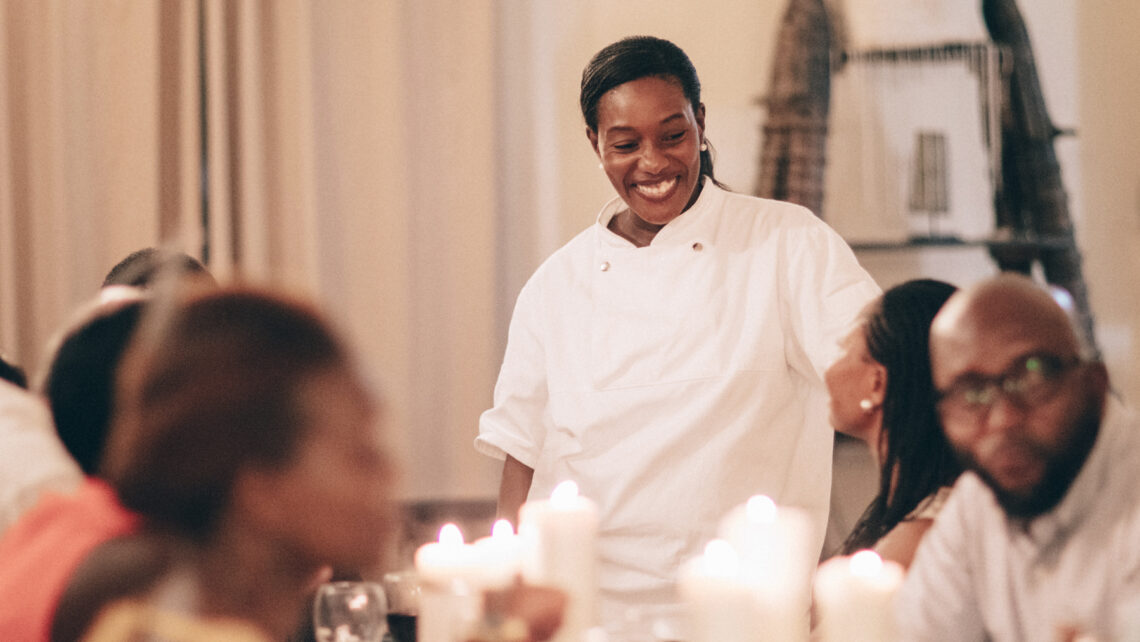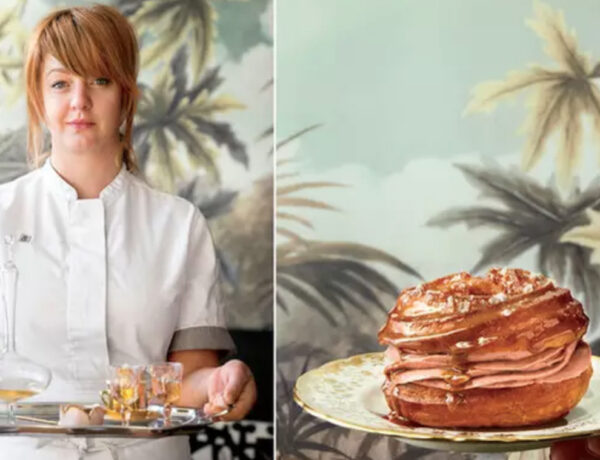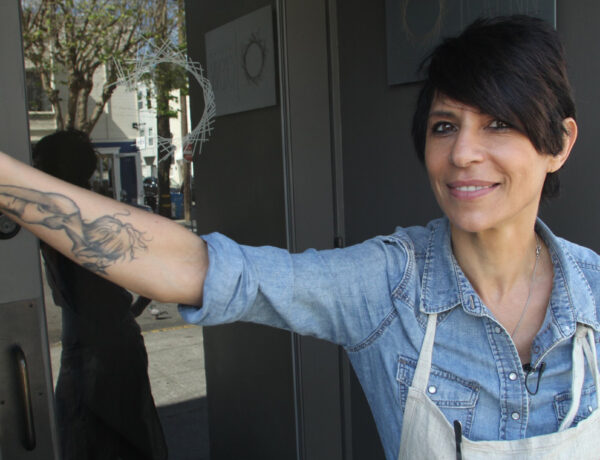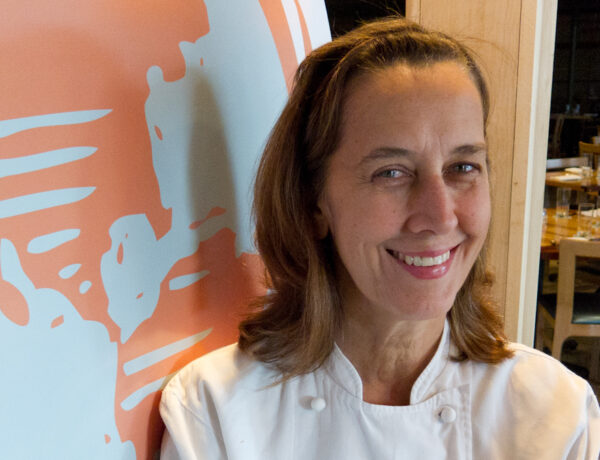Chef Selassie Atadika believes that food is a means to tell stories, share culture, and honor tradition. Through her nomadic dining series, Midunu—which is based in Accra, Ghana—she spotlights the rich heritage of Pan-African cuisine. Utilizing traditional African ingredients and plant-based dishes, this incredible chef draws from tradition to inform her culinary innovations.
In this interview, Chef Selassie opens up about her experience as a woman of color working in foodservice, and why she believes sharing African expertise on plant-based eating is vital to global sustainability.
You have an academic background in environmental studies and worked with the U.N. before joining the food world. How has this background shaped your culinary journey?
Yeah, I’m a late career chef! I’ve always loved food. Even from childhood I was always in the kitchen shadowing my mom as she cooked Ghanaian dishes. Growing up in the States, we basically ate at home every day. I’ve always joked that Mother’s Day and her birthday were the only two days that she didn’t cook for us.
Later, when I began traveling for work, I started learning how to cook more Ghanaian dishes. I wanted to have food from home, food from my mom…food that reminded me of those comforting memories.
I think academics and my time working at the U.N. shaped the way I approach my food. A lot of what I do now is based on those experiences. I primarily worked in development and humanitarian response for the U.N. During this time, I started to look at food from an economic and sustainability point of view. Now, when constructing my plates, my geography background really starts everything off. I think: What grows here? What naturally exists here?
I traveled a lot with that job and got to see a lot within the continent [of Africa] that most people weren’t seeing. I traveled to many places that were coming out of conflicts. But I was always able to see the foundation of the cuisines there—even though most of my colleagues didn’t seem to get it or appreciate the food.
After several experiences like that, I knew I wanted to showcase African cuisine to Africans who hadn’t had a chance to travel widely within the continent and to non-Africans who hadn’t experienced African foods in the ways that I had.
At Midunu, this desire to showcase Pan-African cuisine drives many of our dishes. The ingredients we use and how we prepare them varies depending on the country, or even the region, we’re in.
What else influences the ingredient and dish choices you make at Midunu?
These are the many different lenses that I use as I start thinking through my menus. There’s a cultural lens: How is this ingredient currently being used?

An economic reality check: Why are more people not using this ingredient? What are the challenges of getting it onto the plate? What can I do with this ingredient that’s delicious but has been overlooked? How do I give value to something that has been overlooked?
I also apply a historical lens: What has the historical use of this ingredient been? What are some of the preservation techniques that come into play? How do I exhibit that and not hide from it? I want to showcase traditional African culinary practices in ways that allow us to appreciate them in the modern context.
There’s a crest symbol we have in Ghana called “Sankofa.” It shows a chicken holding a golden egg with its feet facing forward but its neck turned back. It symbolizes learning from the past and taking it forward with you. This symbol inspires a lot of what I do with my food. There’s this idea that if we keep the food super traditional, it will get marginalized and held back from evolving. But I think it’s really important to take traditional ingredients and ask: How do we take it forward? How can we value what we actually have?
I want to showcase traditional African culinary practices in ways that allow us to appreciate them in the modern context.
What’s the food like in Ghana today?
When I moved back here five years ago and looked at the modern culture and diet, it didn’t reflect what I remembered as a child. It’s kind of scary for me to see what’s changed even in the five years since I’ve been back. While living in the States, my school friends would ask me what the food in Ghana was like. I would always tell them, “It depends.” We ate so many different carbohydrates and proteins.
Now, I see a lack of biodiversity. The food became “rice-i-fied,” mostly for convenience. In Accra, people have become super interested in eating animal protein because it’s a sign of wealth. What a loss it would be if we change the way we eat and turn away from the traditions that uphold what is good.
It really hit me when I was naming traditional dishes in my kitchen and realized that people had never heard of some of them or said they just weren’t being prepared anymore. I did find some challenges preparing the more traditional dishes; and I have been working toward addressing those challenges within my own dining experiences. I hope to find a way to broaden the conversation about how we eat, and the foods we’re making at home or eating elsewhere, to bring it to the people within the country.

We love the approach that Midunu takes on plant-forward dishes and how it highlights the importance of plant-based eating as a more sustainable option.
What inspired you to focus on, and then share the traditional aspects of Pan-African cuisine?
Part of this comes from a not-so-great place, but it helped me to clarify why I do what I do. I had a conversation with a cookbook publisher who asked: Why would any American want to buy an African cookbook? It took me back a bit. I didn’t realize that’s where we had to start from. It made me really think about why it’s important that people should care about African cuisine.
The main reason is that our cuisine is primarily plant-based. The African continent is currently home to the largest plant-based diet, followed by Asia. So from a sustainability perspective, it’s actually the best place for us to start examining how and what the people eat.
At Midunu, we use many of the seeds, nuts and beans that compose a lot of the traditional Ghanian diet. We need to keep reminding ourselves that even if we have disposable income to afford fast food or animal proteins, we should still eat a plant-based diet. African food tends to be more “flavor over fat.” Take French classic cuisine, for example. There’s a lot of cream and butter. It’s quite heavy. African cuisine has bold flavors that hit your palate first and carry the dish.
In the last year or so I’ve gotten to a place where I’m not going to dummy down my food and feel like I have to prove that my food “belongs” because it looks like Western food because I’ve taken out the intrinsic flavors to make it taste like it belongs. My food is not going to look like yours and I don’t think it needs to be all delicate and perfect and sexy. I don’t have to wipe out all funky flavors—and I say “funk” as in our funky foods that are delicious but can sometimes be an acquired taste. There are going to be unfamiliar flavors and you’re going to have to experience them.
What else do you think the culinary and world as a whole can learn from the traditions of Pan-African cuisine?
Whole ingredients and low waste. In most cuisines—especially as you move toward fine dining—there’s a lot more food waste because you only want to use certain parts of an animal or vegetable. But in traditional African cuisine, we use everything. Shifting to this more traditional approach has helped me review what I’m trying to do and figure out how to utilize and repurpose different ingredients.
Another aspect of African cuisine I’ve always loved is communal dining. That’s how we ended up with our name, “Midunu.” It means, “come and eat.” We never eat alone. No matter what you have, if someone walks by, you invite them to join you. I’ve seen this practice throughout the continent. There are a lot of places where we still have communal plates. Families sit on the floor or at the table and everyone shares from one plate. This teaches you how to eat and share. You tend not to overeat when you’re sharing with other people because it’s more of a social activity. There are many interesting lessons that can come from that practice.

Lastly, African cuisine uses a lot of wild and foraged foods that we don’t get acknowledged for—mostly because people don’t really know about our cuisine. When I started looking at all of this, I realized how rich and amazing African cuisine is.
Given the need for biodiversity in agriculture around the globe, it’s important to share this approach with the world. In order to feed more people, we have to diversify our staple crops beyond rice, corn, soy and wheat. Things are moving pretty quickly and we need to put a little bit more energy into shifting toward plant-based diets. There’s so much that we can share across continents and countries in terms of what good eating looks like and how to pass on the message.
Has being a woman affected your experience in—or perspective of—the industry?
My experience is kind of unique because I haven’t worked in any major kitchens. I was just like this crazy person who went to culinary school and then decided to go start my own thing. People always ask me: But who did you work with? And I’m like: Nobody. So not only did I start out on my own, I had to win the trust of the male cooks and chefs that came into my kitchen.
A good part of the lack of trust and faith in my capacity as a chef is because of my gender. In Ghana, it’s respectable to be married and have kids. I was an unmarried woman with no kids who had never worked in a professional kitchen. My first sous chef in Ghana was about my age, married with three or four kids and had been cooking for 18 years. He questioned what and how I did things, a lot. I am a light-systems person and a big planner. The way I cook is quite different from how many people cook in Ghana. In general, most eating experiences in Ghana are buffet. We want to make sure no one’s hungry, so there’s more food prepared than necessary and not a lot of careful attention to detail like there would be in plated dishes. One of my dishes might have ten or twelve components, so measuring out and understanding exactly how much to make is important to me.
My sous chef was more accustomed to freestyle cooking. I didn’t realize until about two years in how he wasn’t listening to me until I worked without him. Working directly with an intern on an event made me realize that he was just saying “yes” to me but then doing things however he wanted while I dealt with other elements.

Since then, I’ve tried to keep my kitchen pretty female. It may change as things evolve in the coming years, but I’ve made a serious effort to make sure most of the kitchen is made up of women. I appreciate working with women because I don’t get a lot of the attitude, you know, of not being taken seriously.
Beyond gender discrimination, have you faced any additional hurdles in your career?
I would say that the additional layer of being a woman of color has been a bigger hurdle for me.
The race aspect has been interesting because in Ghana all of the restaurant and hotel executive chefs are expatriates from South Africa or elsewhere. Other Ghanaian chefs who trained in South Africa have told me that even though they were doing the work, they were overlooked for a job when they came back. Or sometimes, if they did get hired, the pay scale was clearly skewed.
I was tapped by the Danish embassy for the Queen’s dinner at a hotel. The hotel’s chef was a white man from South Africa. When he was told that I was taking the lead on this menu–the recipes, the concept, everything–with his team as my support, he said there is no way that I was taking over his kitchen.
I decided to have a one-on-one conversation with him. I showed him some of my dishes. He looked at the photos on my Instagram account and asked, “You’re the one who made the food?” I told him I was, but he kept questioning me: You’re the one? Are you sure you made it? Did you make it in Ghana? Did you make it by yourself? Are you the one who took the picture?
It was just like complete and total disbelief. I’m not sure how much of it was because I was a younger woman and how much of it was because I was Ghanaian.
Food is art. Food is culture. Food is agriculture. Food is economy. Food is nutrition. Food is medicine. Food is politics.
What advice would you give to women just getting started in food and or who are facing challenges and getting started?
I think one of the biggest challenges is finding the right space to ask for help. I recently did a fellowship at Stone Barns. There, we practiced an exercise called “I want, I have” in a room of 100 or so women. We stood up and said, “I need this..” or “I want that…,” If somebody in the room had it, they would stand up and say “I have that. I can connect you with that lawyer who does intellectual property.” Or, “I have a book agent that I think would love your story.”
I think finding mentors, finding other women who are in similar spaces, and asking for the help that you need isn’t always obvious—nor is being able to accept that help—but it’s the first piece of advice I’d give.
The second would be to find your tribe. I tend to have my head down, but I’ve come to realize that you actually do need supporters and a couple of people who you can call to be in your corner or just sit next to you on those days that you just really need support.

What are you most excited about when it comes to the future of the foodservice industry?
What’s really exciting for me is that food is a place to share culture. It’s a space to share history and it’s a place to tell stories. We don’t always get a chance to see that, but food means so much and the interconnections are so heavy. We are talking about it now more than we had been.
Food is art. Food is culture. Food is agriculture. Food is economy. Food is nutrition. Food is medicine. Food is politics (who has it and who doesn’t). I think that the full complexity of food is starting to come back to us. It was there at the beginning but we lost it somewhere after the Green Revolution. There are so many different chefs out there telling this story from a cultural lens, an environmental lens, a “feed more people” lens. There’s just so many ways of looking at food. I think once we are able to embrace that, we’ll have a healthier relationship with it, which will enable sustainability, health and so many other aspects of life.






No Comments